Description
CHAPTER ONE
INTRODUCTION
- BACKGROUND TO THE STUDY
This research is on The effect of poverty on rural people of Gboko local government. Poverty is a condition of having insufficient resources or income and can also be defined as the state of one who lacks a certain amount of material possessions or money (Encarta 2009). Fundamentally, poverty is a denial of choices and opportunities, a violation of human dignity. It means lack of basic capacity to participate effectively in society, and it implies not having enough to feed and clothe a family, not having a school or clinic to go to, not having the land on which to grow one’s food or a job to earn one’s living and not having access to credit. Poverty can also mean insecurity, powerlessness and exclusion of individual households and communities. Poverty can further be explained as susceptibility to violence, and it often implies living in marginal or fragile environments, without access to clean water or sanitation (‘’Indicators of poverty and hunger’’ .un.org.). World Bank (2001) refers to poverty as pronounced deprivation in wellbeing, and comprises many dimensions. It includes low incomes and the inability to acquire the basic goods and services necessary for survival with dignity. World Bank (2001) also describes poverty to encompass low levels of health and education, poor access to clean water and sanitation, inadequate physical security, lack of voice and insufficient capacity and opportunity to better one’s life. David Moore (2009) argues that some analysis of poverty reflect pejorative, sometimes racial stereotypes of impoverished people as powerless victims and passive recipients of aid programs. Poverty in its most extreme form is a lack of human needs such as adequate and nutritious food, clothing, housing, clean water and health services. Extreme poverty can cause terrible suffering and death, and even modest levels of poverty can prevent people from realizing many of their desires. The world’s poorest people are many of whom live in developing areas of Africa, Asia, Latin America and eastern Europe struggle daily for food, shelter, and other necessities. They often suffer from severe malnutrition, epidemic diseases outbreaks, famine and war. In wealthier countries such as the United States, Canada, Japan, and those in Western Europe, the effects of poverty may include poor nutrition, mental illness, drug dependence, crime and high rates of diseases (Encarta 2009). Perception of poverty is an imaginative extension of thought that conceives of poverty as an agent of pollution. The World Bank (2007) defines extreme poverty as living on less than $1.25(PPP) per day, and moderate poverty as consumption or income per person below the poverty line has decreased in each region of the world since 1990.The importance of studying the effects of poverty cannot be overemphasized for Some people believe that poverty results from lack of adequate resources on global level. Resources such as land, food and building materials that are necessary for the well-being or survival of the world’s poorest people. Some individuals are still unaware of their poverty status and some considered poverty a necessary or desirable condition which must be embraced to reach certain spiritual, moral or intellectual states. This study explored the use of qualitative approach to measure the perception and effect of poverty on the farmers’ household. It is on this background that the study identified the socio-economic characteristics of the respondents; determined the qualitative measurement of household poverty, the perception of poverty by households in the study area and the coping strategies of households to poverty were also determined. The study further determined the significant relationship between the socio economic characteristics of the respondents and the effects of poverty on the household welfare.
- STATEMENT OF THE PROBLEM
Rural poverty is looked upon by different individual and groups in various ways. It has been seen as a problem which is to be solved by the government and perhaps individuals or groups rather people look at poverty as a disgrace.
Poverty has been with us for quite a long time not only in Gboko local government area, where the study is being conducted but the entire nation.
Infact, so much has been written on the cause and effects of this phenomenon in our contemporary society. Most of those writers concentrated their finding and writing at glance but as social human interest the problem still worries my mind even for that I want to carry out a research into the following?
- What effects has the poverty in those in rural area?
- What brought about poverty at the grass root level?
- How can this problem be solved.
1.3 STATEMENT OF THE PROBLEM
The statement of the problem associated with rural poverty includes:
- Disease on the increase in the rural areas as a result of poverty.
- Nature and artificial disaster such as a drought and erosion contribute to rural poverty.
iii. Low productivity and famine also make the rural populace to be poor.
- Insufficient medical care services such as clinics in most of the council wards in the local government.
- Inadequate good roads and electricity contribute to rural poverty.
- Under and unemployment make rural people to be poor.
vii. Ignorance and lack of good access to education.
1.4 OBJECTIVES OF STUDY
The major objectives of this study are:
- To remove the misconception in many circle in developing economic that poverty is for the poor people.
- The rural area, that study poor are as a result of urban bias by government and investors.
- To determine the possible way of alleviating poverty in our societies.
- To provide suggestion on ways of enhancing a high standard of living of the rural people.
- To ascertain the level of poverty in our societies.
- Finally to provide guide for other researchers who may wish to write on the related topic.
1.5 SIGNIFICANCE OF THE STUDY
This study which focuses on the effect of poverty on rural people of Gboko local government has the following significance.
- The causes of poverty such as of insufficient jobs opportunities.
- The recommendation which if implemented will help government design policies that will alleviate rural poverty.
- To serve as source data for future researchers who may carryout studies in similar field.
1.6 LIMITATION
I am limiting the study on Gboko local government particularly to the five (5) council wards which include Mbatiav, Mbatyerev, Mbayion, Ipav and Yandev.
This limitation is because of the following problems:
- Time
- Money
- Transportation
1.7 DEFINITION OF TERMS
For the purpose of this study the following terms are defined below:
- POVERTY: This means on individual who lack the resources to obtain the type of diets participate in the social activities and have the living conditions and amenities which are necessary for good living.
- RURAL AREA: It is an area with a low population density of less them 20.00 inhabitants per two scarce Km with less social amenities.
- SOCIAL PROBLEM: This is the lack of such social amenities of electricity pipe borne water etc.
- INSUFFICIENT INCOME: This is countries that lack employment or steady employment or lack of any other productive activity.

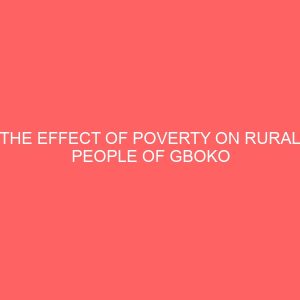

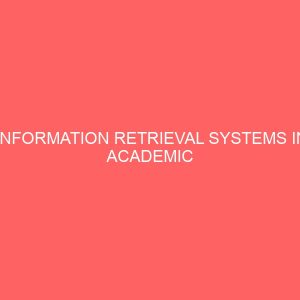
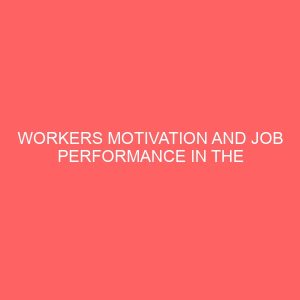
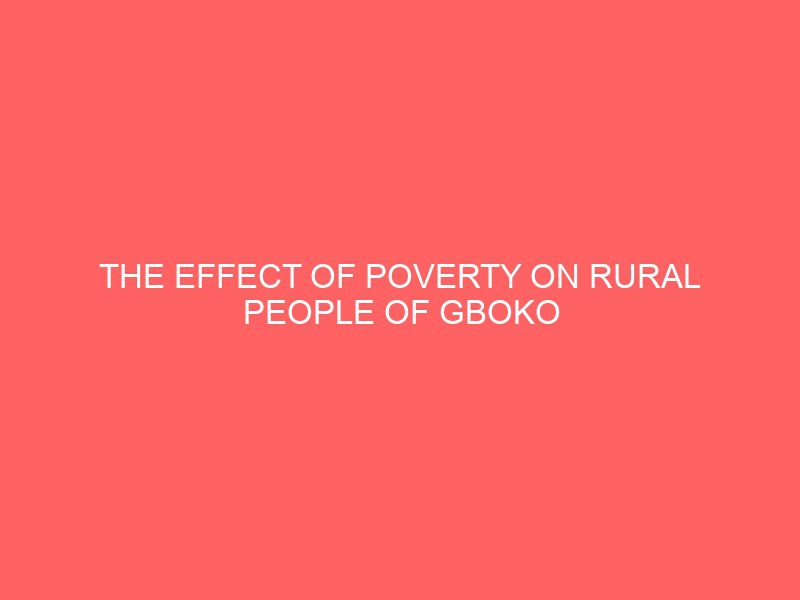
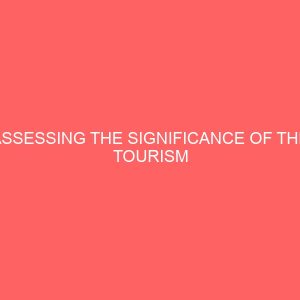
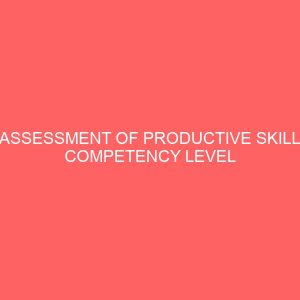
Reviews
There are no reviews yet.